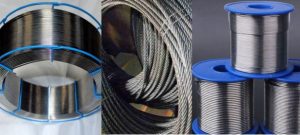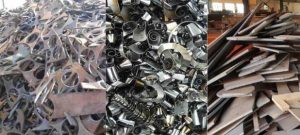Producing precision parts requires material that is strong, lightweight and dependable. These parts usually encounter stress, heat and abrasive conditions. There’s a metal that can weather it all—titanium. Titanium grade round bars are a reliable source for creating components that will perform without failure. From airplane bolts to surgical screws, these bars provide strength and stability where they’re needed. In this post, we’ll cover what titanium round bars are, their types, key benefits and how they’re used in making high performance precision parts.
What is Titanium Grade Round Bars?
Titanium grade round bars are solid metal rods composed of various titanium alloys. They are formed into a round shape and employed as raw material for machining intricate parts. The “grade” means the kind of titanium alloy, and each grade provides certain characteristics such as strength, corrosion resistance or flexibility. These bars are valued for their ability to hold up in extreme environments—like inside engines, under the sea, or even inside the human body. Their combination of low weight and high strength makes them ideal for turning into precise, durable parts.
Types of Titanium Round Bars
Titanium round bars exist in a variety of grades, each of which is appropriate for particular applications according to strength, corrosion resistance and formability. The following are the most frequently used grades for precision components
Titanium Grade 1
Grade 1 is the softest and most flexible type of titanium. It provides superior corrosion resistance and is simple to form and weld. It’s frequently used in chemical processing equipment where toughness is less important than resistance to harsh substances.
Titanium Grade 2
This is stronger than Grade 1 but still very workable. Titanium Grade 2 Round Bar is used extensively in marine components, industrial equipment and surgical instruments. It is a common choice when there is a requirement of moderate strength and toughness without compromising on the ease of fabrication.
Titanium Grade 5 (Ti-6Al-4V)
Grade 5 is the most popular as it possesses high strength, low weight and has a good heat resistance. It is utilized in aerospace components, surgical implants, as well as high-performance engine parts. It is more difficult to machine but provides unparalleled performance.
Titanium Grade 7
Grade 7 is similar to Grade 2 but includes a small amount of palladium. This addition provides it with greater resistance to corrosive atmosphere and highly acidic solutions. It’s commonly employed in equipment and chemical plants that deal with aggressive fluids.
Titanium Grade 9 (Ti-3Al-2.5V)
Grade 9 is a medium strength alloy that offers better formability over Grade 5. It’s applied where components must be strong but also easily formed. It’s employed in aircraft tubing, bike frames, and light structures. It’s a good balance of strength, corrosion resistance and workability.
Benefits of Titanium Grade Round Bars
High Strength, Low Weight
Titanium grade round bars offer an excellent mix of durability and low mass. This strength-to-weight ratio enables components to support high stress without contributing to unwanted weight. The metal is strong even when minimized in size, fitting perfectly in compact areas.
Corrosion Resistance
Titanium naturally forms a thin oxide layer on its surface which protects it from moisture and chemicals. This barrier remains stable even in harsh environments, preventing damage over time. The result is a material that stays intact, without needing coatings or treatment.
Heat Tolerance
These circular bars can tolerate extreme temperatures without compromising their strength or shape. Even during thermal stress, the metal is resistant to warping, cracking and expansion. This steadiness provides uniform performance over a broad spectrum of temperature conditions.
Long-Term Reliability
Titanium bars resist wear and physical degradation, allowing parts to last through years of use. Their durability reduces the need for frequent replacements or repairs. Over time, this adds up to greater dependability and less downtime.
Biocompatibility
Titanium is non-toxic and doesn’t trigger unwanted reactions when in contact with organic matter. Its surface remains stable and inert, making it safe for sensitive applications. This compatibility comes without altering the metal or adding extra materials.
Non-Magnetic Properties
Unlike many metals, titanium does not become magnetized. This makes it suitable for applications where magnetic fields could interfere with performance or measurement. Its stable, non-reactive nature ensures consistent behavior in sensitive environments.
Low Thermal Expansion
Titanium expands very little when exposed to heat. This property helps maintain tight clearances and precision in parts exposed to temperature changes. It supports consistent fit and function, even in complex assemblies.
Uses of Titanium Grade Round Bars in Making Precision Parts
Aerospace Parts
Aircraft components must meet exact design limits and operate under strict tolerances. Titanium round bars are shaped into fasteners, brackets, and engine fittings that require consistent accuracy. These parts must align perfectly during assembly to ensure seamless integration across the structure.
Medical Devices
Surgical-grade round bars are machined into detailed parts like bone plates, screws, and implant hardware. The material allows for precision shaping needed in small, intricate devices. Surgeons depend on these exact fits for reliable placement during procedures.
Automotive Components
In performance and racing vehicles, round bars are used to make precision engine valves, rods, and shift linkages. These parts are designed to handle high speeds and quick response times. A small variation in measurement could affect control or output.
Marine Hardware
Machined marine parts like shafts, seals, and housings must be dimensionally stable. Titanium bars are turned into components that keep machinery sealed and aligned. This ensures proper functioning of submerged systems and moving equipment.
Industrial Equipment
Precision-machined round bars are used to build control parts in pumps, filters, and processing tools. These systems rely on carefully shaped internal parts to maintain flow rates or apply exact pressure. Even small size errors can disrupt entire operations.
Sports Gear
High-performance bicycles, golf clubs, and other sports tools use finely machined parts from round bars. Designers use them to create frames, joints, and supports that follow tight design specs. Exact fit ensures consistent handling and feel for the user.
Defense and Military Tools
Custom components like targeting mechanisms, mounts, and sight systems are crafted from round bars. These parts must match exact blueprint data to ensure alignment and coordination with other tools. Field performance often depends on these precision builds.
Conclusion
Titanium grade round bars are more than just metal rods. They are the backbone of many precision parts that help machines fly, save lives, and push performance to the next level. Their mix of strength, light weight, and resistance to damage makes them hard to beat. Whether in a jet engine or a bone implant, titanium round bars help make sure the part works right, lasts long, and never lets you down. That’s why industries around the world keep choosing titanium—when precision counts, it’s the right choice.





